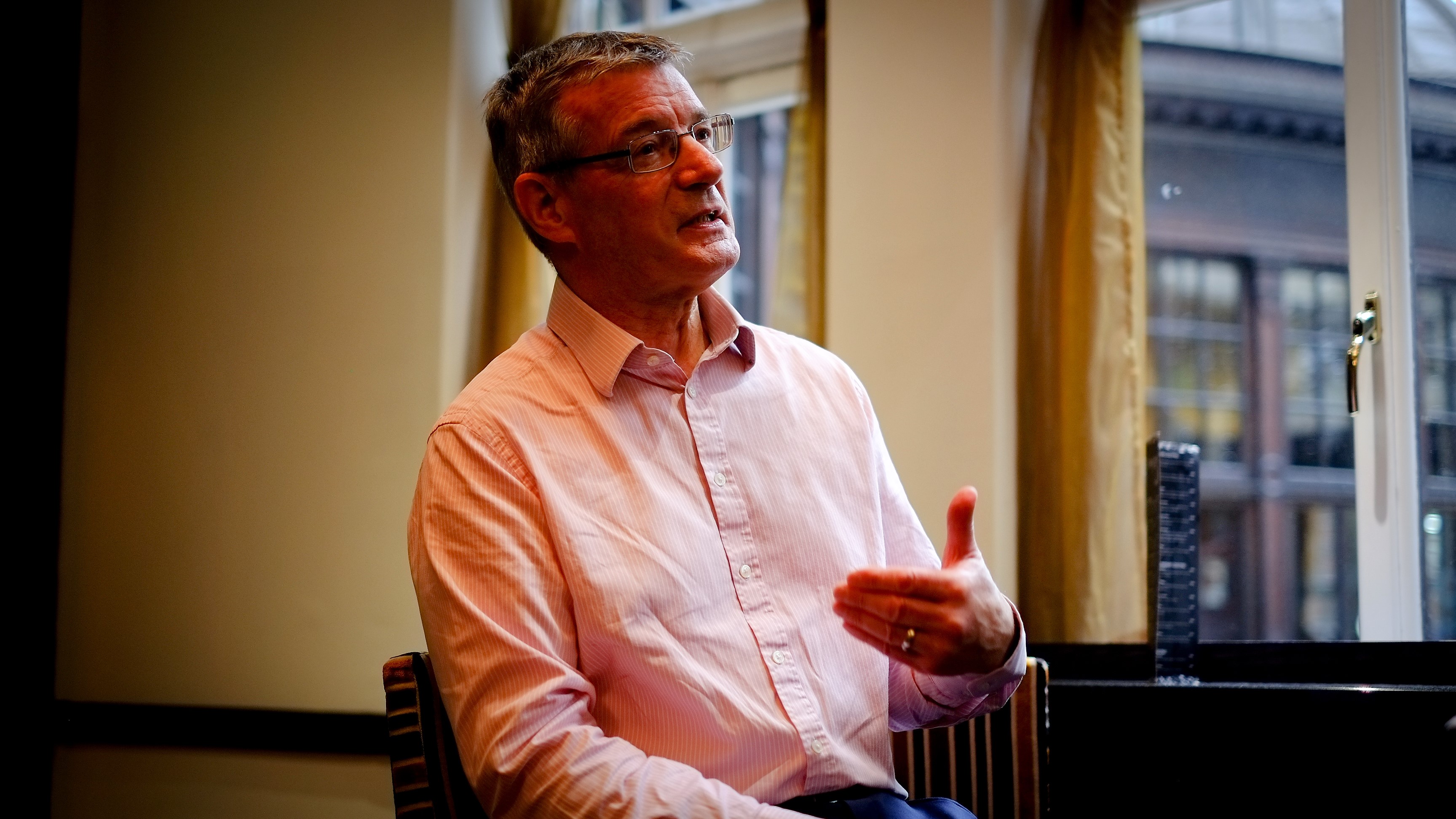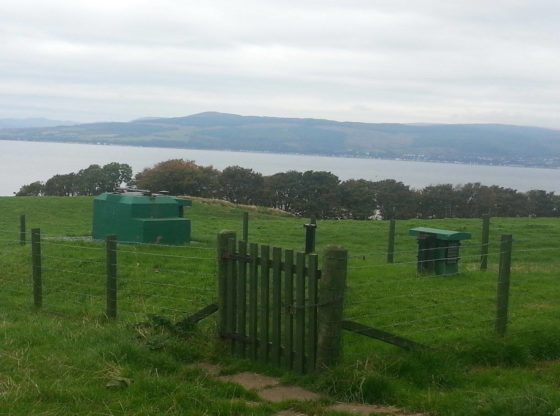A Member of the European Parliament since 1984, David Martin is the UK’s longest serving MEP. Greatly respected across party lines, David’s main policy interests lie in the areas of development and aid for trade, global access to medicine, human rights, institutional reform, and animal welfare. David is set to retire in 2019, the same year that the UK will also ‘retire’ from the EU. What is his take on Brexit? How does he regard the UK’s chances of securing strong bilateral trade deals after it? And where does he see Scotland’s place in all of this? CABLE’s Lindsay Hastings caught up with David in Glasgow’s Grand Central Hotel.
Q: How have your fellow Euro parliamentarians responded to the Brexit vote, David? Has the mood changed in Brussels?
It’s surreal in many ways because the parliament carries on as normal. There’s no change to the day-to-day routine of the European parliament. As far as I can detect, no change in the flow of legislation coming through from the European Commission. Brexit is however, always looming in the background. I would say the biggest difference is that many British MEP’s are looking to their own future. We’ve already lost four British Labour MEP’s who have announced they are leaving, and three Conservative MEP’s too, which signifies a drift away from the Parliament. Interestingly and encouragingly, younger members who were elected in 2014 have made it very clear that they, despite their disappointment over Brexit, are determined to see through the whole of this European Parliament and have committed to be there until 2019. Some of the older members see Brexit as an unfortunate but natural end to their careers.
Of course, I am absolutely opposed to Brexit. I think it is a disaster for the United Kingdom but in terms of my own personal position, it makes virtually no difference to me because I was going to retire in 2019. I’ve done 35 years in parliament so I feel it is time to move on. This however, doesn’t detract from the fact that I’m devastated by the decision.
Q: You’re the UK’s longest serving MEP. What is your greatest achievement in this role?
The one I’m most proud of is creating something called RECHAR which was an EU programme which provided funding for former coalfield areas. I pushed this through the body called RETI at the time, a French acronym for the Association for Areas of Industrial Decline. Through collaboration was mainly from Scotland, Yorkshire, Northern Calais and other parts of Europe. Local councils got together and created a campaign for increased assistance to aid regeneration and recovery in areas where mines had been closed.
I pushed this forward in the European Parliament and I was extremely fortunate that Bruce Millan - former Secretary of State for Scotland - was the Commissioner for Regional Policy. When I approached Bruce, he was very easy to convince on the need for this programme. So he then took it up and drove it forward in the European Commission. On one side, Bruce was persuading the Commission that this was a good idea and on the other I, with the rapporteur, pushed it through the European Parliament.
“There are villages alive today in parts of Scotland that I think would have disappeared without the RECHAR programme.”
RECHAR literally brought millions in to the former coalfield areas. In most of the villages in West Lothian, Mid-Lothian, or in Ayrshire, you’ll find clubs, swimming pools and other community facilities that have got the RECHAR sign on them, signifying their funding by the European Commission. I’m convinced that the success of RECHAR was due to the fortunate dynamics in Brussels at the time. Bruce was the Commissioner for Regional Policy, I was on the Regional Policy Committee and there was a European-wide campaign to support it. It was a combination of hard work and good fortune that the right people were in the right place at the right time. There are villages alive today in parts of Scotland that I think would have disappeared without the RECHAR programme.
Q: Given that the Brexit vote was the result of a democratic referendum, is it undemocratic to try to halt Brexit?
Absolutely not! I think it’s important to respect the outcome but that does not mean to say I must agree that it was a good decision, or the right decision. It certainly doesn’t mean you can’t campaign to change it. I’m not particularly big on the idea of referendums but having already had one, I think the only way to reverse the decision would be to have another referendum. I don’t think you could do it through a General Election, or by sleight of hand. It would have to be done by a second referendum.
Just as I regret the Tories winning the last General Election, I respect the fact that they have the right to govern. But that doesn’t mean that for however long they’re going to govern, we don’t try and change the situation. I do not accept that they should be allowed to govern for 5 years. If we can kick them out before those years are up, we should. Referendums fall under the same category, though my only qualification is that if we’re going to change the Brexit decision, I think now it has to be changed by a referendum.
“I think a second EU referendum would have the support of the British people because it would in fact be a way of empowering them in the process. It would be an opportunity to say: ‘Okay, you voted to leave. We’ve negotiated the leave position. This is the package on offer. What do you think of it?’ It would put people back in control.”
Ahead of the referendum, I think people had a one-dimensional decision to make: ‘Do you want to leave the European Union or not?’. But they had nothing to weigh that against. They had no idea what leaving the EU would actually mean in practice. Now, at the end of this negotiating process, when we know what the deal is, what Britain is going to be offered by the EU, I would say that that’s the point at which we should have a second referendum. I don’t think that is in any sense undemocratic. I think a second EU referendum would have the support of the British people because it would in fact be a way of empowering them in the process. It would be an opportunity to say: ‘Okay, you voted to leave. We’ve negotiated the leave position. This is the package on offer. What do you think of it?’ It would put people back in control.
The British government needs to decide what it wants from Brexit. Clearly it doesn’t have a clue. It’s over a year since the referendum and we’ve only received the so-called white paper, we’ve had no real information about what the government’s aims are, only generalities about trade with the rest of the world and good relationships with other EU members. Nothing specific. If the government wants to engage people in terms of its vision, it needs to tell us what that vision is. If it wants to engage people in terms of how we resolve the complexities, it needs to face up to these complexities because at the present time, the government does not admit to the serious problems that have occurred as a result of the Brexit vote. There are organisations that the British government keeps dismissing, sweeping everything under the carpet, and claiming that if Europe would just behave itself, we can all get on and everything will be fine. It’s just nonsense.
“Even now, although our Brexit papers are being published and the European Parliament is being proactive, I still don’t think the EU is doing enough to explain to the British people the consequences of Brexit.”
The other side of that story is what Europe should be doing. We are starting to do more but I would like to see more. The EU took the view in advance of the referendum that it’d be counterproductive to be engaged in the UK’s referendum campaign. Clearly, it would have been wrong for it to be campaigning in terms of a remain vote. But it should have done more to explain what Brexit would mean, and what the EU already did for Britain. We didn’t do that. Even now, although our Brexit papers are being published and the European Parliament is being proactive, I still don’t think the EU is doing enough to explain to the British people the consequences of Brexit. One of my naive hopes after the referendum was that people would start to understand the EU because it would have to be debated, and a clearer view of the EU would be presented. A year on, I’m not actually sure that people are any better informed.
Michael Gove famously said “we reject the opinion of experts”. That seems to me an entirely stupid remark. Prior to the referendum, I actually think there was a lot of intelligent information presented in the public domain. Open Europe produced some very good information and tried to create transparency in the whole Brexit process. Other think-tanks were doing good work in that respect. But there was also a bit of complacency, I think. People assumed it’d be alright on the night.

With the benefit of hindsight, I don’t think the period just before the referendum was the critical period. And I don’t think the period during the referendum was the critical period. I think where pro-Europeans failed to make the case was ten, fifteen, maybe twenty years ago, when all these stupid little ‘EU stories’ came out. I can remember stories that Scottish mince was going to be banned, that bagpipes were going to be banned. Struan Stevenson was the author of that bagpipe banning stuff, and all because Helle Thorning-Schmidt, who became Prime Minister of Denmark, was pushing through a report in the European Parliament on noise abatement at work. Struan said that if you were walking down the high street and the bagpipes were playing, this would be illegal. Big nonsense.
So we had this story, we had that story: prawn crisps, bent bananas, the whole lot. As I said, pro-Europeans dismissed these stories without acknowledging their impact because we thought they were so utterly crazy that they wouldn’t have an impact. But I think they did. Clearly, they were slowly getting into peoples’ minds. There were bigger stories as well, of course. For example, the idea on the left that Europe stops you funding public services which it clearly does not. So on the left, there were stupid stories. On the right, there were stupid stories. When you threw immigration into the mix, we should have realised what kind of fight we were in.
Q: There’s much talk of a TTIP-like UK-US trade deal after Brexit. Will it happen? If it does, should we be concerned?
The EU-US trade deal is still on the table, although not as live as it was a few years ago. The infamous TTIP: the Transatlantic Trade Investment Partnership. In the European Parliament, we did a lot of work to make sure that this was going to be a fairly progressive trade deal but we never managed to get that message across to the British public. We were, of course, keen to secure TTIP before President Obama went out of office because we knew that if any Republican came into office, the deal would be dead.
First, from an American point of view, the deal was bad for agriculture because Europe had made it clear that it wouldn’t accept hormone beef, it would not accept chlorinated chicken, and there were a whole load of animal welfare standards that wouldn’t be accepted by the European Union. Thus, American farmers were already opposing TTIP.
Second, we got into that deal for the protection of European public services and high social and environmental standards. Europe was committed to remaining part of all the international environmental conventions and agreements. This meant that the Americans - had they signed TTIP - could not have broken the Paris Climate Accord without also breaking TTIP. I mention this in the context of your question about a US-UK trade deal because I don’t think the UK will insist on any of those things, or the high standards. Michael Gove said on the radio this morning that he wouldn’t accept chlorinated chicken but I’m not convinced about that. In any US-UK deal, the American agricultural lobby will certainly insist on good market access for their agricultural products. America will roll us over in terms of agricultural access.
“Any trade deal with America will be about American access to us. We might get a bit better access to the US market but there won’t be any significant change to the existing EU-US trade relationship. If you listen to Liam Fox, our International Trade Secretary, he puts consumers as a priority rather than jobs: it seems clear that his focus is putting cheaper American imports into the British market.”
I also don’t believe the health service and other public services will be protected in a British-American deal and I cannot envisage in any of our trade deals, the United Kingdom demanding high environmental, social, and labour standards. In all EU trade deals, we have a separate Partnership and Cooperation Agreement (PCA) which is not part of a trade deal but signed in conjunction with it. A PCA includes human rights and other conditions for an agreement to which America, with regard to TTIP, had already made clear that they did not want to sign, even under the Obama Administration. Furthermore, Trump’s tweet that he wants a trade deal with the UK contained the word ‘jobs’ in capital letters. Any trade deal with America will be about American access to us. We might get a bit better access to the US market but there won’t be any significant change to the existing EU-US trade relationship. If you listen to Liam Fox, our International Trade Secretary, he puts consumers as a priority rather than jobs: it seems clear that his focus is putting cheaper American imports into the British market.
I see nothing which indicates that the UK will have a stronger trading position being out of the EU. When I was the trade spokesmen for the Socialists and Democrats Group in the European Parliament, I went a good few times to the US to talk to American officials, including Mike Froman who was President Obama’s Trade Representative at the time. In one meeting, the discussion became heated and I said to him: “The problem is, you’ve never had to deal with an equal partner before and you’re finding that frustrating”. To which he replied: “That’s true. But you’ve never had to deal with an equal partner before and you’re finding that frustrating”.
“What people should consider with American trade deals - apart from TTIP - is that ninety to ninety-five percent of all their deals are based on a template. And they deliver that template. What the Americans actually negotiate on is the five percent on the margins: that’s the five percent that we, the UK, would be trying to influence.”
It was true. The EU is so big - half a billion people - that it can get an awful lot of what it wants in trade negotiations. For example, the deal the EU is doing with Japan is interesting in that Japan has conceded agricultural access for European Union producers. This is something it has never conceded in any other trade deal before. I think it shows that the EU has enormous negotiating clout - because it’s half a billion in size. America has serious clout because of the size of the American markets. But Britain, with sixty million people, simply does not have the same negotiating clout and will always be the junior partner when negotiating with America. What people should consider with American trade deals - apart from TTIP - is that ninety to ninety-five percent of all their deals are based on a template. And they deliver that template. What the Americans actually negotiate on is the five percent on the margins: that’s the five percent that we, the UK, would be trying to influence.
Q: You recently met Bernie Sanders. What was that about?
I shouldn’t put it this way but I will. It was really about getting some of Bernie’s gold dust for the political left in Europe. We’ve been trying to forge a progressive alliance across the Atlantic. The original idea was that we’d try to create a progressive TTIP. But now we’ve come to the view that, whether TTIP is alive or not, we need progressive contacts across the Atlantic. To date, they’ve not been as good as they should be. With members from twenty-eight different member states and strong resources, the Socialists and Democrats Group believe, rightly or wrongly, that we could be the vehicle for that connection with progressives in the United States.
We’ve worked closely with Elizabeth Warren in the past. I suspect Warren might well be on the ticket for the next President or Vice-President of the United States. She’s a very impressive person and I’m pretty confident that she’ll be on the ticket. There were rumours that Hillary Clinton was going to pick her in the last election campaign but chose against having two women on the ticket. So, we have Elizabeth Warren interested in forging progressive transatlantic relationships. The AFL-CIO [a federation of fifty-five American unions] and their President Richard Trumka are also very interested in this and they have enormous resources and are very progressive in terms of American politics. We’ve a number of contacts in the Senate and Congress as well.
“One of the big issues we talked about - and only transatlantic cooperation can achieve this - is how we tackle tax avoidance and tax evasion. It’s costing the European and American economies trillions in lost revenue. This, of course, has a negative impact on the funding of public services.”
I believe this is something that can only really be driven from what could be considered the broad left. I say this because even Bernie Sanders would be considered fairly centrist in a European context. The issues we see as crucial are labour standards and we broadly believe in open markets. But not unfair markets. So we’re grappling with the question of how to keep open markets but protect labour standards. Can we agree common labour standards across the Atlantic to ensure that any open trading system doesn’t drive down environmental or labour standards? With the environment, Bernie is very keen to have the US remain in the Paris Climate Accord. Despite the way it has been reported so far, and despite President Trump’s announcement, the US is not yet out of the Accord.
One of the big issues we talked about - and only transatlantic cooperation can achieve this - is how we tackle tax avoidance and tax evasion. It’s costing the European and American economies trillions in lost revenue. This, of course, has a negative impact on the funding of public services. If we could capture some of the tax money that’s not presently being paid, we could achieve much in terms of restoring our health and other public services to where they should be.
Q: Scotland seems to have been lied to about getting more powers after Brexit. Where will Brexit leave Scotland?
In terms of devolved powers, my own position is that all of these powers should come back to Scotland. I accept that some of them perhaps need to be shared but the dynamics of how to administer these powers and cooperate with England, Wales and Northern Ireland is a decision for the Scottish Parliament. The obvious one is fishing. It should be up to Scotland to decide how to operate and work with our partners in terms of who gets access to the territorial waters.
Similarly with agriculture. I can see an argument for having common standards on either side of the border. But again, surely under the devolved system, power should come back to Scotland and then Scotland would have the ability to work out, through the Joint Ministerial Council or other mechanisms, how we share those responsibilities. My worry is that if this doesn’t happen, not only with these issues but others too, the old saw ‘a power devolved is a power retained’ will be verified. If Westminster decides to keep something, it can keep something. It will create more uncertainty about what devolution really means for Scotland.
Q: Looking forward, how can Scotland protect its relationship with the EU?
Even as a Labour politician, I think the current Scottish government is doing a good job. It’s right that it should be actively engaged with the European institutions. The First Minister has made a number of visits to Brussels, Mike Russel as the Scottish Brexit Minister has also been touring Brussels and other European nations in order to build up relationships. I think Scotland must maintain as close a relationship as possible with the other EU member states. I’m afraid the government’s proposal to remain part of the European Economic Area is not going to happen, although I do think it was a sensible proposal. It was always going to be difficult to deliver but I think it was right to try it. Even without that, there are other areas such as justice and home affairs, students and university cooperation, cultural exchanges that I think Scotland should continue to work on, in order to maintain close relations with the European Union.
“Even as a Labour politician, I think the current Scottish government is doing a good job. It’s right that it should be actively engaged with the European institutions.”
Let’s be clear: the best option is that we don’t leave. But if we are going to leave, the second best option is to somehow remain part of the single market and customs union. Scotland, Britain as a whole, will suffer if we’re not in the single market. And the wider trading consequences of Brexit are as important. One figure that is being widely accepted, as it is both factual and apolitical, is that if the UK loses just one percent of its trade with the European Union, we’d have to balance that by seeing a five percent increase in our trade with the BRICS [Brazil, Russia, India, China, South Africa]. That’s a big increase. Would it happen?
The thing is that Europe doesn’t presently stop us trading with the rest of the world. In fact, we already do more trade with the rest of the world than we do with the European Union. EU membership is no impediment to trading with the rest of the world. And there is no clear reason why suddenly, once we’re out of the single market, other countries would want to trade more with us. Indeed, countries outside the EU may want to trade less with Britain because one of the reasons some of them trade with us is to have access to the European single market.
People are only just beginning to understand that a lot of trade is not about selling a whole good and selling into another market; it’s about supply chains and the great attraction of the single market is the supply chain of five hundred million people. You are able to produce parts of your product in different countries and then assemble the whole product without any technical barriers or customs barriers. Britain will be far less attractive in that context outside of the single market.

Contrary to what we’ve been told, not only will the UK’s trade with the European Union diminish - our trade with the rest of the world could be under threat as well. This doesn’t affect Scotland so much but there has been recent progress on an EU free trade agreement with Japan. Such an agreement would mean that in seven years time, there’d be no tariffs on cars coming into the EU from Japan. If Britain leaves the single market without any other agreement, we will move to the WTO tariffs which will be almost ten percent on our cars. So why would the Japanese manufacture cars in Britain and face a ten percent tariff on selling to the rest of the European market when they can sell from Japan directly to the EU on a zero percent tariff? That is just one example and I fear there’ll be many more.
“So why would the Japanese manufacture cars in Britain and face a ten percent tariff on selling to the rest of the European market when they can sell from Japan directly to the EU on a zero percent tariff?”
In terms of Scotland, we are quite a big service economy. Canada is an alternative option if we are not in the single market - a CETA [Comprehensive Economic and Trade Agreement] type trade deal. Canada does not have a goods and services agreement with the European Union so all the services we’d want to sell into the single market through a Canada-type agreement wouldn’t be covered by that. This may damage our service industry and in particular, the financial sector. Though not as big as it has been in the past, and perhaps should be, the steel industry might also find it more difficult to access the niche markets it currently has in Europe if the technical standards change.
It’s about the potential of tariffs on exports and changing technical standards, as well as implications for our farming industry. The classic case is Welsh lamb being exported into France - quite controversially because the French don’t like the idea of their people eating Welsh rather than French lamb. I’m very much against the transportation of live animals but if you take live sheep to France, they currently don’t have to go through any inspection. But if we aren’t in the single market, they will. There are no existing inspection posts in France right now. Though this example does not have a great effect on Scotland, I think it shows the challenges that Brexit will bring. Those challenges are only now starting to get through to people. If you found it hard living with the European Union, try living without it.
Feature image. David Martin MEP speaking to Lindsay Hastings, 26th July 2017. © David Pratt. All Rights Reserved.
CABLE would like to thank the staff of the Grand Central Hotel in Glasgow.











